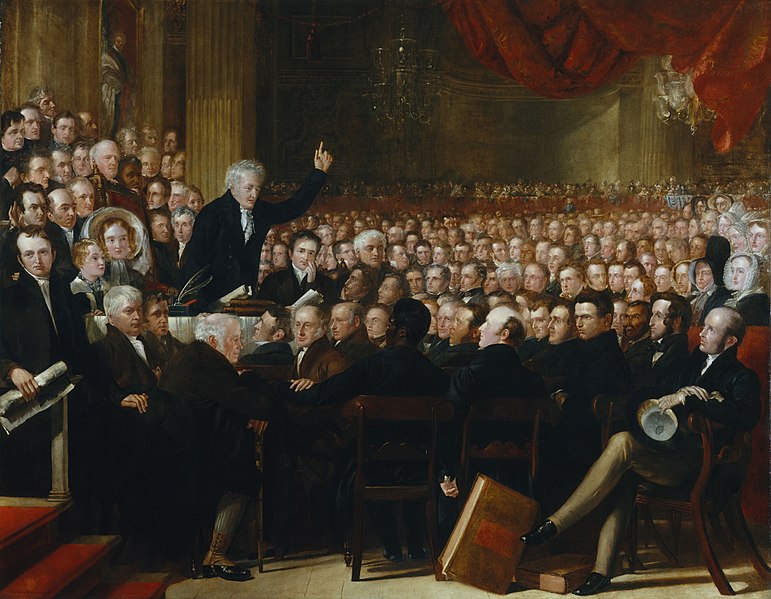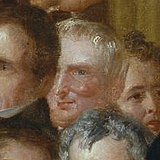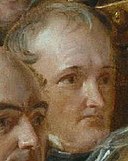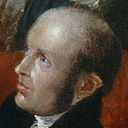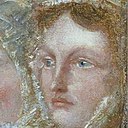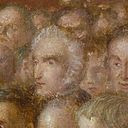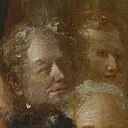| Uñt’ayawi |
English: The Anti-Slavery Society Convention, 1840, by Benjamin Robert Haydon (died 1846), given to the National Portrait Gallery, London in 1880 by the British and Foreign Anti-Slavery Society. Oil on canvas, 1841. 117 in. x 151 in. (2972 mm x 3836 mm). See source website for additional information.
Quote from the description at the National Portrait Gallery website:
This monumental painting records the 1840 convention of the British and Foreign Anti-Slavery Society which was established to promote worldwide abolition. A frail and elderly [Thomas] Clarkson addresses a meeting of over 500 delegates. [...] Haydon later wrote: 'a liberated slave, now a delegate, is looking up to Clarkson with deep interest ... this is the point of interest in the picture, and illustrative of the object in painting it, the African sitting by the intellectual European, in equality and intelligence'.
Identified persons in this portrait (based on National Portrait Gallery description) follow. For an image map showing the location of each person in the painting, see image.
- Abraham Beaumont (1782-1848)
- Amelia Opie (1769-1853), Novelist and poet; second wife of John Opie
- Anne Knight (1792-1868)
- Anne Isabella Byron, Baroness Byron (1792-1860), Wife of Lord Byron
- B. Godwin, Baptist preacher
- Charles Edwards Lester, American abolitionist
- Charles Stovel, Baptist minister and abolitionist
- Charles Stuart, abolitionist from Jamaica
- Constantine Richard Moorsom (1792-1861), Vice-Admiral
- Cyrus Pitt Grosvenor (1792 – 1879) , American abolitionist
- Daniel O'Connell (1775-1847), Irish politician
- David Turnbull
- Dr Murch
- Edward Adey
- Edward Baldwin
- Edward Barrett, Emancipated slave and abolitionist
- Edward Smith
- Edward Steane
- Elizabeth Pease
- Eton Galusha, American Baptist minister
- Francis Augustus Cox (1783-1853), Baptist preacher
- François-André Isambert, French, lawyer and abolitionist
- G.K. Prince
- George Bennett
- George Bradburn, American abolitionist
- George Head Head
- George Stacey (1787-1857)
- George Thompson (1804-1878)
- George William Alexander (1802-1890), Treasurer of the British and Foreign Anti-Slavery Society
- Henry B. Stanton
- Henry Beckford, Emancipated slave and abolitionist
- Henry Sterry (1803-1869)
- Henry Taylor
- Henry Tuckett
- Isaac Bass (1782-1855)
- Isaac Crewdson (1780-1844), Writer
- Isaac Hodgson (1783-1847)
- J. Harfield Tredgold
- J.H. Johnson
- Jacob Post (1774-1855), Quaker
- James Carlile (1784-1854), Divine
- James Dean, American abolitionist
- James Gillespie Birney (1792-1857), American abolitionist
- James Mott, American abolitionist
- James Whitehorne
- John Angell James (1785-1859), Independent minister
- John Beaumont (1788-1862)
- John Birt, American abolitionist
- John Bowring (1792-1872), Linguist and traveller; Politician and diplomatist
- John Burnet (1789-1862), Pastor of Mansion House Chapel, Camberwell
- John Cropper
- John Ellis (1789-1862), Railway promoter
- John Howard Hinton (1791-1873), Baptist minister
- John Keep, American abolitionist
- John Morrison
- John Scoble
- John Steer (1780-1856)
- John Sturge
- John T. Norton, American abolitionist
- John Woodmark
- Jonathan Backhouse
- Jonathan Miller, American abolitionist
- Joseph Cooper (1800-1881)
- Joseph Eaton (1793-1858)
- Joseph Ketley
- Joseph Marriage (1807-1884)
- Joseph Pease (1772-1846), Reformer
- Joseph Reynolds (1769-1859)
- Joseph Sams (1784-1860), Orientalist
- Joseph Soul
- Joseph Sturge (1793-1859), Quaker and philanthropist
- Josiah Conder (1789-1855), Bookseller
- Josiah Forster (1782-1870)
- Louis Celeste Lecesne
- Lucretia Mott (1793-1880), American abolitionist
- M. L'Instant, Haitian abolitionist
- Mary Clarkson, Daughter-in-law of Thomas Clarkson
- Mrs John Beaumont (1790-1853)
- Mrs Rawson, Sheffield campaigner
- Mrs Tredgold, British South African
- Nathaniel Colver, American abolitionist
- Peter Clare (1781-1851), secretary of the Literary and Philosophical Society of Manchester
- Professor Adam, American slavery abolitionist
- Richard Allen (1787-1873) from Dublin
- Richard Barrett (1784-1855)
- Richard D. Webb
- Richard Peek ex Sheriff from Devon
- Richard Rathbone
- Richard Robert Madden (1798-1886), Writer
- Richard Sterry (1785-1865)
- Richard Tapper Cadbury (1768-1860), Birmingham manufacturer
- Robert Forster (1792-1871)
- Robert Kaye Greville (1794-1866), Botanist
- Samuel Bowly (1802-1884), Quaker and anti-slavery agitator
- Samuel Fox (1781-1868)
- Samuel Gurney (1786-1856), 'The Banker's Banker'; philanthropist
- Samuel Jackman Prescod, abolitionist from Barbados
- Samuel Lucas (1811 – 1865), later editor of the Morning Star
- Samuel Wheeler (1776-1858)
- Saxe Bannister (1790-1877), Pamphleteer
- Sir Edward Baines (1800-1890), Journalist
- Sir John Eardley Eardley-Wilmot, 1st Bt (1783-1847)
- Sir John Jeremie (1795-1841), Colonial judge
- Sir Thomas Fowell Buxton, 1st Bt (1786-1845), Philanthropist
- Stafford Allen (1806-1889)
- Stephen Lushington (1782-1873), Judge
- T.M. McDonnell
- Thomas Binney (Benny) (1798-1874), Nonconformist divine
- Thomas Bulley
- Thomas Clarkson (1760-1846)
- Thomas Clarkson, Grandson of Thomas Clarkson
- Thomas Morgan
- Thomas Pinches
- Thomas Price
- Thomas Scales
- Thomas Swan
- W.T. Blair
- Wendell Phillips (1811-1884), American abolitionist
- William Allen (1770-1843), Chemist and philanthropist
- William Beaumont (1790-1869)
- William Bevan
- William Boultbee
- William Brock (1807-1875), Dissenting divine
- William Dawes, American abolitionist
- William Dillworth
- William Fairbank (1771-1846)
- William Forster (1784-1854), Quaker philanthropist and minister
- William James
- William Kay
- William Knibb (1803-1845), Missionary
- William Leatham (1783-1842)
- William Morgan
- William Smeal (1792-1877)
- William Tatum (1783-1862)
- William Taylor
- William Wilson
|
